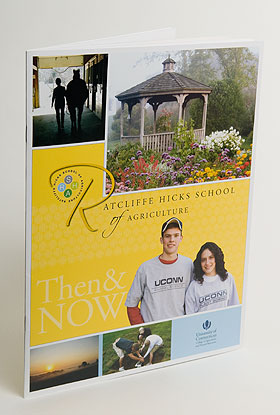  |
| HOME | THIS ISSUE | CALENDAR | GRANTS | BACK ISSUES | < BACK | NEXT > |
Ratcliffe Hicks School continues UConn’s land grant missionby Elizabeth Omara-Otunnu - October 9, 2007 | ||||
| Most of the roughly 3,200 first-year students arriving at the Storrs campus this fall hope to complete their degrees in four years. A few hope to earn a degree in two. Each year, 30 to 40 students enter the Ratcliffe Hicks School of Agriculture to pursue a two-year associate’s degree with a concentration in either plant science or animal science. Graduates are in high demand.
The School draws students who are looking for a practical education, says Cameron Faustman, professor of animal science, director of the Ratcliffe Hicks School, and associate dean of the College of Agriculture and Natural Resources. He says the School’s role and its relationship to the College are not widely understood. A new brochure, Ratcliffe Hicks School of Agriculture: Then and Now, is designed to provide this and other information to the public and to potential students. Ratcliffe Hicks students take classes taught by faculty in the College of Agriculture, as well as at least five general education courses. Some of the students Faustman describes as “late bloomers.” Others are already working in an agriculture-related field but want to pursue a degree. Yet others are seeking a career change. Experiential learning is a hallmark of the Ratcliffe Hicks education, Faustman says. Classroom instruction accounts for about half the coursework, but sometimes the “classroom” is the barn or the field. Professor Mary Musgrave, head of the plant science department, says, “The two-year program is popular with both students and employers because a lot of hands-on experience and learning takes place in a relatively short time.” About 60 percent of the School’s graduates go on to complete a four-year degree, most of them at UConn. Brittany Florio earned an associate’s degree in Ornamental Horticulture. She is now studying for a bachelor’s in plant science. She says the two-year program was good preparation. “Without that solid foundation in study skills, time management, and basic education, I would not be as successful academically now.” Florio welcomed the opportunity to specialize in agricultural topics from the start. “I was able to take a variety of plant science courses in the Ratcliffe Hicks program to test different areas of interest,” she says. Joyce Hart graduated from Ratcliffe Hicks in 1979. She now works with her husband in the three retail garden centers and florist shops they own in eastern Connecticut. “No one in my family had gone to college before,” Hart says, “and I thought the two-year school was a good place for me to start.” She went on to graduate from the School of Education in 1982. “After two years at Ratcliffe Hicks, I didn’t want to leave,” she says. “I got wrapped up in the excitement of learning.” In her business, Hart still deals with people she went to school with. “I made a lot of contacts,” she says. The School was founded in 1941 through a bequest from Ratcliffe Hicks, a former Connecticut legislator. The endowment still supports the school in part. Faustman says that although having both a two-year and a four-year program is unusual at UConn, other institutions offering certificates or associate of applied science degrees within their colleges of agriculture include Michigan State, Ohio State, Penn State, and the Universities of Maryland, Massachusetts, and Wisconsin-Madison. Michael Darre, professor of animal science, says some community colleges in the area offer two-year degrees in agriculture, but UConn is the only institution with full programs in plant and animal science, with facilities and animal species close at hand. “You don’t have to drive five miles off campus,” he says. Ratcliffe Hicks students also have the advantage of learning from professors engaged in research and extension specialists dealing directly with industry, who bring the latest information into the classroom, he says. Faustman says the School benefits both its students and the University. “The farm units exist anyway for the four-year agriculture programs,” he says. “Through the Ratcliffe Hicks School, they can be taken advantage of by up to 80 additional students.” The students, in turn, many from agricultural backgrounds, help maintain the farm units that support the College of Agriculture. Ratcliffe Hicks students pay the same as students in four-year programs, and have access to the same facilities, including libraries, residence halls, student life, and other support services. There are many employment opportunities for graduates of the program. Those who study Ornamental Horticulture or Turfgrass Management may work in floriculture, landscaping and grounds maintenance, greenhouse and garden center operation, nursery and fruit production, turf management, park and land maintenance, or arboretums and botanic gardens. Those who focus on Equine Studies or Dairy/Livestock Management may pursue a career in animal health, production agriculture, breeding and genetics, nutrition, meat and food science, or food handling and production. Darre says Ratcliffe Hicks graduates are well qualified to work right away, for example on a farm or golf course. “They can work hands-on, in the trenches,” he says. In some fields, such as turfgrass and horticulture, the state does not currently have enough graduates. “We have employers calling up and asking to hire students who will be completing the program,” says Musgrave. “It’s often very competitive for employers to get these new graduates.” |
| ADVANCE HOME UCONN HOME |

